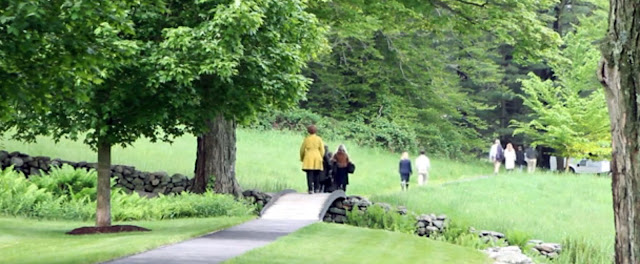“It is important to let others lead from time to time, to not assert your leadership which, I admit, sometimes feels made up.”
As the leader of the lecture and the reason all comers came, he walked third in the procession down the lawn, kicking up orange leaves. Johnson’s glass house looked on from the side.
It was at this time, for the first time in years, that he sensed his place as leader sublimate.
“Do you mean to imply that the feeling of your position being made up is itself a trigger for your creative struggles?”
All sat and the felled silence awaited his insight.
He’s a clever one, with his euphemisms… substituting “creativity” for “leadership”. He saw his young self in the crowd, a non-conforming snarkster with a t-shirt from the distillery upstate not covering his sown skin (it was fifty degrees maybe).
“I remember when I took a Sunday off with Charlotte to visit the Hudson River Distillery near New Paltz. The day was overcast, and we rode quietly. Houses passed, the occasional deer, all the pastoral nostalgia contained within the falling leaves. I felt the silence of their descent as they landed out of sight behind the barley and corn. The hour was still early– but how would we find this place? It was certainly off the beaten path…”
Was it really one of his influences? Everyone thought that he strongly disliked Le Corbusier… but “really” was being trumped by the prospect of an enigmatic, unbeaten path of a story.
“…I remember the tingle in my stomach when we got out of the car and I saw the building. I was nearly brought to short breath by its earnestness, its open-armed sincerity. It was just living its life out here away from the gaze of society; not only had it been performing a function harmoniously, organically, however you want to describe it, for its world, but it had essentially invented that function as well…”
A man gripped his glass, its last inch of tonic lapping around. How out of place it looked, along with us, in our suits and wingtips, upon a green lawn and before a weightless house. These lawns, just like the grass on a particular hill near Plano, Illinois, were quietly orchestrated tableaux of nature– nature dumbed-down, nature domesticated, for the precise purpose of brushing the perfect amount against the gentleman’s brown shoes, giving him leaves to kick and empty vanishing points to gaze upon. Perhaps their pastoralism was a bit off target. I pinched myself to stay warm. Others pinched themselves to stay awake….
“…I looked upon the silos, and that was it. It was my Corbusian moment, if you will. I have strived for earnestness ever since.”
“But (sir) how can you call it earnestness when it harks back to a time that is largely invented? Or when the edifice can easily invent its own functions? It is being earnest only to itself.”
Scanning the audience he located the only two eyes that were not half-closed. The face reminded him of himself as a young man… when he waited eagerly for every next revelation, when he found good love, when he took the weekend trip off the beaten path to a distillery and discovered his architectural voice in a lonely silo.
The edifice invents its own history, its own means to cobble the path to this prestigious end.
“But as a leader, young man, as an architect, as an inventor of goodness and rightness, I feel I am more than encouraged to make such distortions. You sit in this house, upon that chair, and the temperature is below tolerable. But I have deemed this irrelevant. And if you cannot see so, it is then your following which must be adjusted, not my initiative.”, or so he wished to say, to himself, sitting there upon a clean folding chair, upon the optimistic grass.
“Thank you. We can now take questions.”
Give me your best. There is no path, no building, no tree or branch, no gesture or murmur, no gust of wind, no crease in your suit, that I can’t snatch a veiling thread from. There is no story I cannot weave.
Winter 2012-13. Inspired by Conversations in Context & Philip Johnson’s Glass House.


